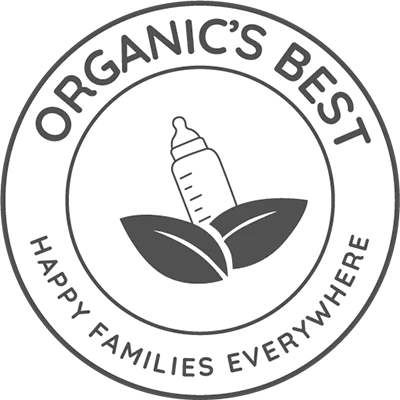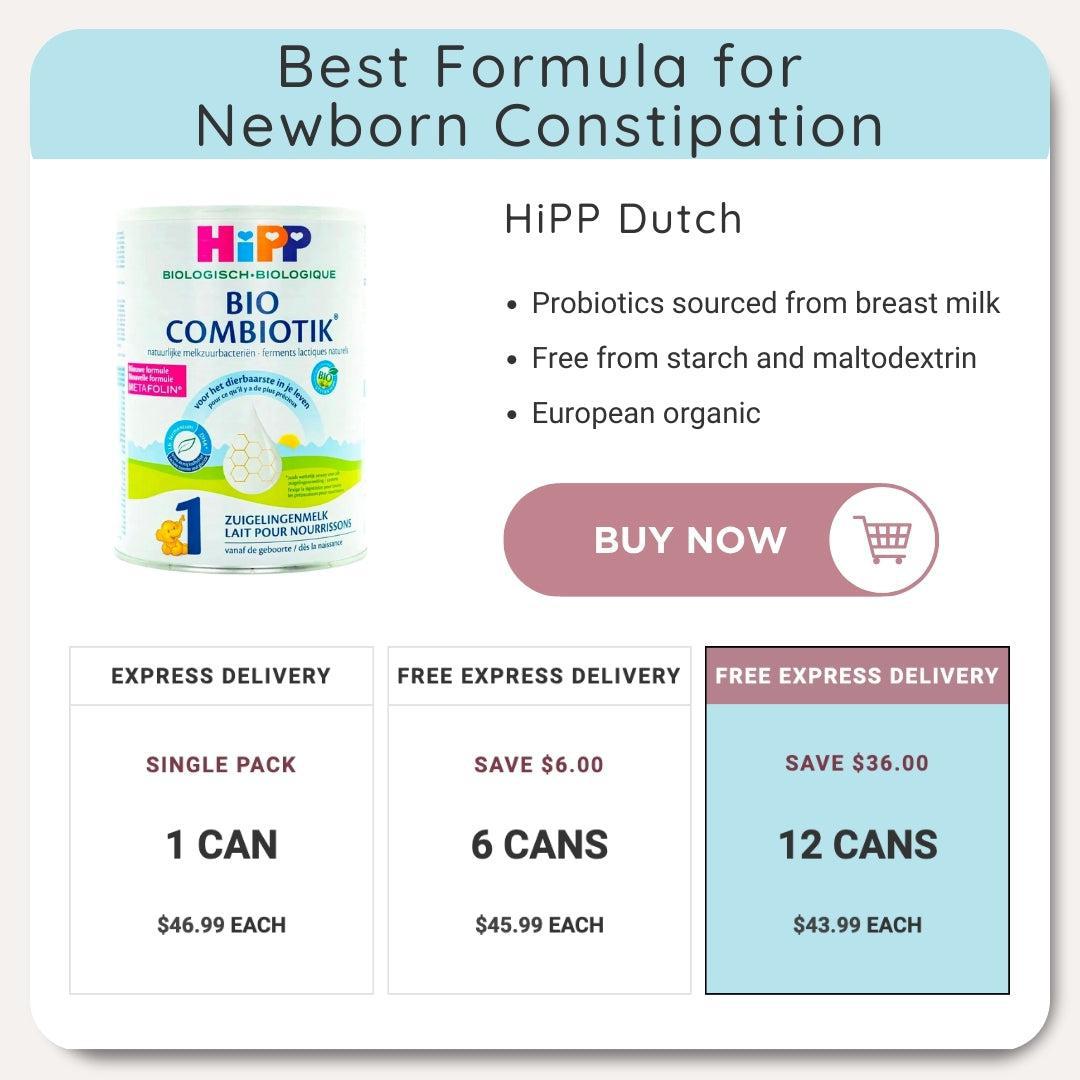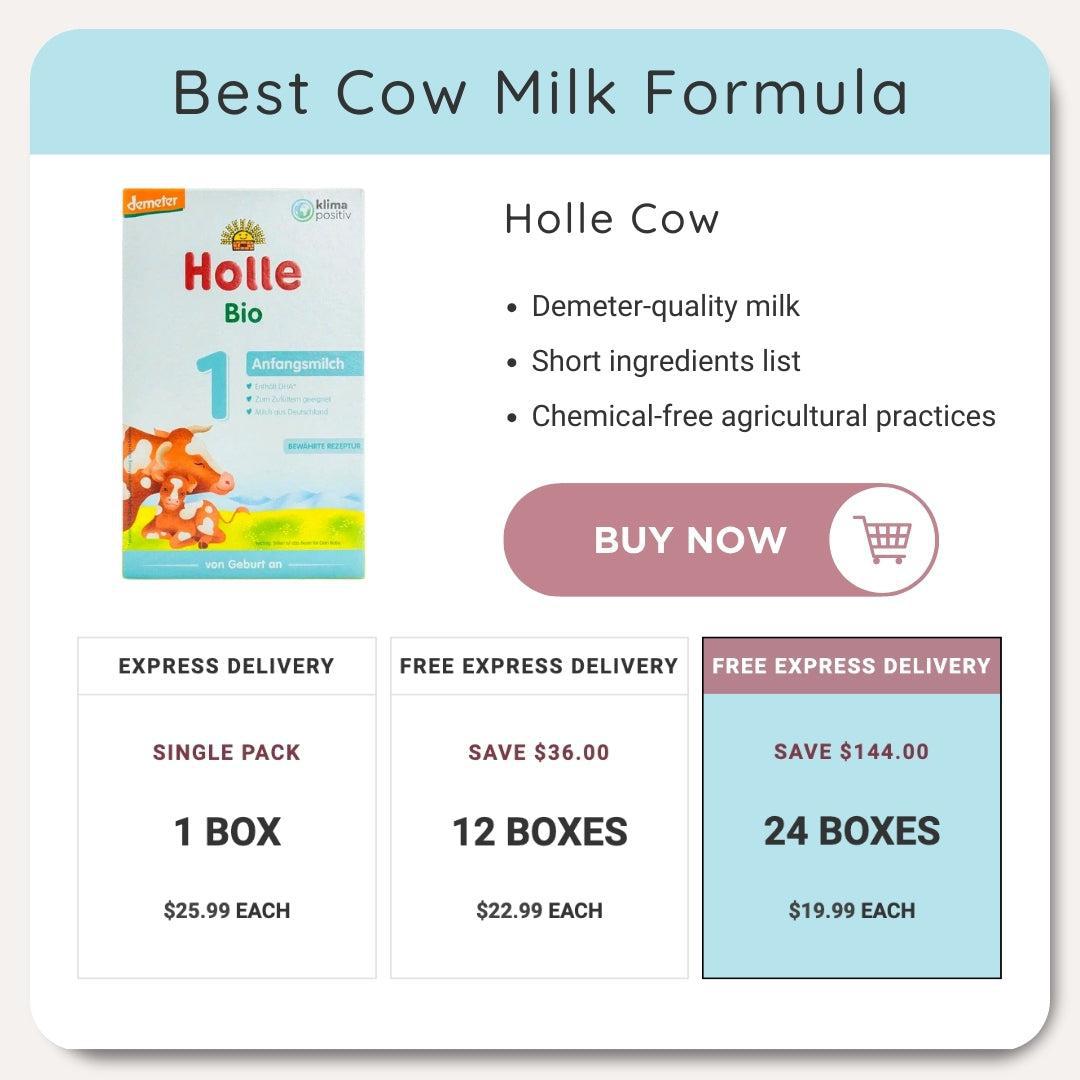Click to Get 2 FREE Boxes/Cans
Only New Customers! Order 12 Boxes of Formula or More to Get 2 Extra Boxes/Cans for Free With Your First Order
BABY FORMULA
Offering new parents top-quality European infant formula from renowned brands like HiPP, Holle, Kendamil, and more. If you’re uncertain about which product to choose, our Formula Finder can help you make the best decision for your baby.
Baby Food
Offering new parents a premium selection of European baby foods, including jars, pouches, cereals, and snacks from esteemed brands like HiPP and Holle.
What's the Best Baby Formula for Constipation?
by Agustina Fernandez January 17, 2024 16 min read

As a parent, you're probably no stranger to dirty diapers. While the never-ending cleaning and changing can be unpleasant, it's a relief to know that your baby's digestive health is in good shape. But what does it mean when your little one starts soiling fewer diapers?
If this sentence strikes a chord with you, don't worry; you're not alone! Babies are prone to all kinds of tummy troubles, including constipation. Thankfully, there are solutions out there, and many babies who experience constipation will respond favourably to certain kinds of baby formulas, which are designed to alleviate and prevent this uncomfortable condition.
In this article, we explore the common causes and signs of constipation in babies and provide an in-depth guide to selecting the best formula for constipation from European brands. To help you make an informed decision, we focus on evidence-backed benefits and provide an unbiased ranking based on the pros and cons of each product!
Table of contents
- Ranking The Best Formula to Prevent Constipation
- 1. HiPP Dutch - Best Formula for Newborn Constipation
- 2. HiPP Comfort - Best Special Formula
- 3. Holle Goat - Best Goat Milk Formula
- 4. Holle Cow - Best Cow Milk Formula
- Tell-Tale Signs That Your Baby Is Constipated
- Common Causes of Constipation in Formula-Fed Babies
- Is Switching Formulas a Good Idea if Your Baby is Constipated?
- How to Find the Best Formula to Help With Constipation
- Scientific References
Ranking The Best Formula to Prevent Constipation
We're here to help you on your formula-finding journey! To do so, we have spent hours researching formulas, scrutinizing scientific studies, and analyzing ingredient lists so that we can give trustworthy and reliable recommendations based on the latest scientific findings in infant nutrition. We encourage you to check out our "How We Review Page" for more info on our standards for rating each product.

To make our ranking system as comprehensive as possible, we have evaluated each baby formula based on five key criteria: European organic certification, non-GMO ingredients, lactose or milk as the primary ingredient, no added sugars or artificial sweeteners, and the inclusion of ARA & DHA.
We've also awarded bonus points for the inclusion of probiotics, prebiotics, and the absence of maltodextrin, starch, and palm oil. Each performance category is assigned 1 point for a maximum of 10 points in total.
Here, we have included a table with our rating of each infant formula, which is discussed in more detail below.
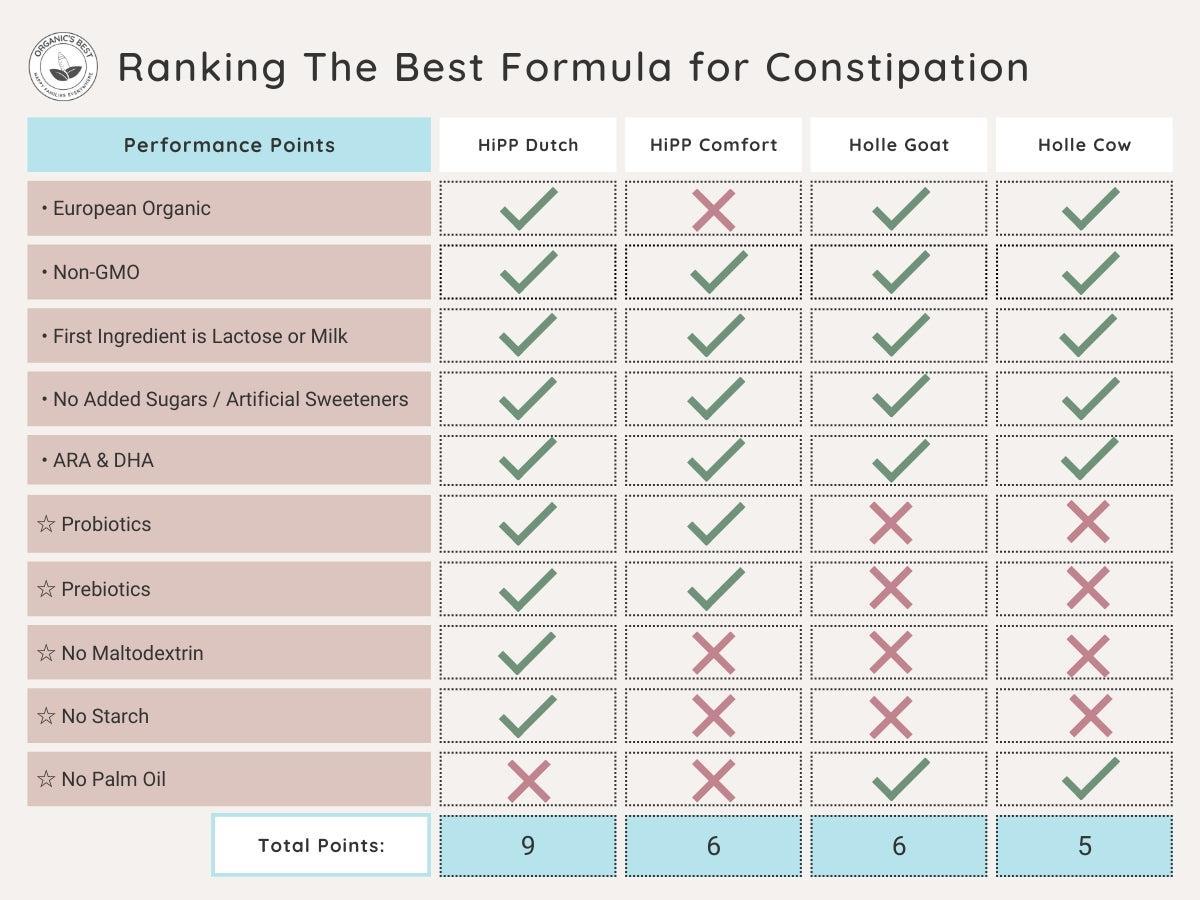
HiPP Dutch - Best Formula for Newborn Constipation
HiPP Dutch infant formula is made in Germany with a blend of organic ingredients. It is 100% lactose-based across all stages, meaning it’s extra gentle on even the tiniest of tummies. Its unique formulation is designed to help relieve common digestive conditions in infants like colic, constipation, bloating, and gas.
Pros ✔️
-
Enriched with probiotics originally sourced from breast milk
-
All stages are free from starch and maltodextrin
Cons ❌
-
Contains sustainably sourced palm oil
Leading Qualities of HiPP Dutch
We were pleased to find that HiPP Dutch is certified EU organic. To gain this certification, at least 95% of ingredients must meet organic standards, which includes adhering to strict chemical-free agricultural practices. Building off of the organic label, this product is also made without the use of GMOs. In fact, based on European organic agriculture standards, the use of GMOs is prohibited during the production process.
This baby formula is impressively 100% lactose-based across all stages. But, as always, quantity doesn't necessarily matter if the product doesn't meet quality standards. Thankfully, HiPP Dutch formula exceeds expectations in both of these areas.
HiPP sources their milk from happy cows, which live in optimal conditions on natural pastures. They spend their days grazing on a diet of grass, straw and grain and, in accordance with EU organic standards, are kept far away from any mineral fertilizers or chemical-synthetic sprays!
It's always a relief to find that a baby formula has no added sugars or artificial sweeteners. But HiPP doesn't just say no to the bad stuff. They also include an abundance of vitamins and minerals meant to support infants at all stages of development.
In particular, this formula contains Metafolin® instead of folic acid, which is more easily absorbed by babies and is similar to the folate source found in breast milk. We also appreciate the inclusion of ARA and DHA in a 1 to 1 ratio, as our review of infant nutrition literature demonstrates this is the most effective balance of these fatty acids for optimal health and development.
Bonus Points Awarded to HiPP Dutch ☆
We are impressed with HiPP's use of natural probiotic lactic acid cultures originally extracted from real breast milk which support digestive and immune health, while also bringing this organic formula as close to breast milk as it gets. Prebiotics are added in addition to probiotics to create a balanced gut microbiome, which can help ease common stomach conditions like constipation, bloating, and gas.
Maltodextrin is an ingredient that has some controversy tied to it. While it is used as a common thickener in many baby formulas, HiPP has chosen to omit this ingredient to further enhance its beneficial effects on sensitive tummies.
Likewise, this formula is starch-free, making it extra gentle. Instead of adding complementary carbs, HiPP Dutch boasts an impressive 100% lactose-based profile!
HiPP Dutch does contain palm oil, which some parents are not a fan of. But, just like their other ingredients, the palm oil used in HiPP baby formula is sustainably sourced and nutritionally beneficial. In this case, it is added to attain a fatty acid spectrum closer to that of breast milk.
What Parents Say 💬 |
HiPP Comfort - Best Special Formula
Some baby formulas are specially made to cater to infants with special dietary needs, such as acid reflux formulas or hypoallergenic formula. HiPP Comfort falls into this category of "specialty formula", as its unique composition makes it suitable for little ones with conditions like flatulence, lactose-related 3-month colic or constipation.
Pros ✔️
-
Has a stool-regulating and stool-loosening effect
-
Has a reduced lactose content
-
Contains particularly easily digestible fat
-
Contains extensively hydrolyzed milk proteins
Cons ❌
-
Contains sustainably sourced palm oil
-
Not certified organic
Leading Qualities of HiPP Comfort
You may have also noticed in the table above that HiPP Comfort lost a point for not being certified organic. Due to the presence of hydrolyzed proteins, the European Commission's organic regulations do not allow products, such as HiPP Comfort formula, to be certified as organic.
However, in our evaluation, we have concluded that this does not reflect on the quality of the product, as all HiPP baby formulas are made according to safe and strict organic farming practices.
One of the ways that HiPP ensures its quality standards is through the exclusion of genetically modified ingredients (GMOs). Research shows GMOs can have potentially harmful effects on our health, and since babies' bodies are so tiny and quickly developing and growing, we think that it is important to feed your breastfed baby or formula-fed baby with natural ingredients.
We were happy to find that lactose is the first ingredient in this baby formula despite it having a reduced lactose content designed to ease digestive discomfort.
One of HiPP's goals is to bring you a baby formula that is close to nature, which is why we are pleased to find that their European infant formulas are based on the composition of breast milk. This also means that they leave out many of the unnecessary ingredients that you wouldn't find in breast milk, like artificial sweeteners or added sugars like corn syrup.
Finally, we also give this formula points for including ARA (Omega-6) & DHA (Omega-3), which are essential fatty acids that play a huge part in eye and brain development.
Bonus Points Awarded to HiPP Comfort ☆
Another great ingredient that serves this baby formula well is probiotic lactic acid cultures, which support digestive health through the modification of intestinal microflora. These teeny tiny microorganisms help protect your baby's gut while also supporting their immune system.
Prebiotics paired with probiotics help create an ideal environment for gut health. In baby formulas, this combo aids in encouraging more regular and softer stools, making this baby formula a fantastic choice if you're hoping to see more dirty diapers from your little one.
While we were initially weary of the inclusion of maltodextrin in this baby formula, after further research, it is clear that the special composition of this baby formula necessitates the inclusion of this ingredient. Since HiPP Comfort has a reduced lactose content, it only makes sense that missing carbohydrates would have to come from another source. Adding corn maltodextrin to infant formula is also known to help reduce intestinal distress, although further research is needed to know the full extent of its effects.
HiPP includes starch in this baby formula, to supplement the reduced lactose content. Since both starch and maltodextrin can thicken formula, some parents have switched to using a wide-mouth nipple when using HiPP Comfort infant formula.
HiPP does use palm oil in this baby formula as a way to make palmitic acid, which is an important component of breast milk, and ensures that the palm oil in their products is sourced in an ecological and fair manner.
What Parents Say 💬 |
Holle Goat - Best Goat Milk Formula
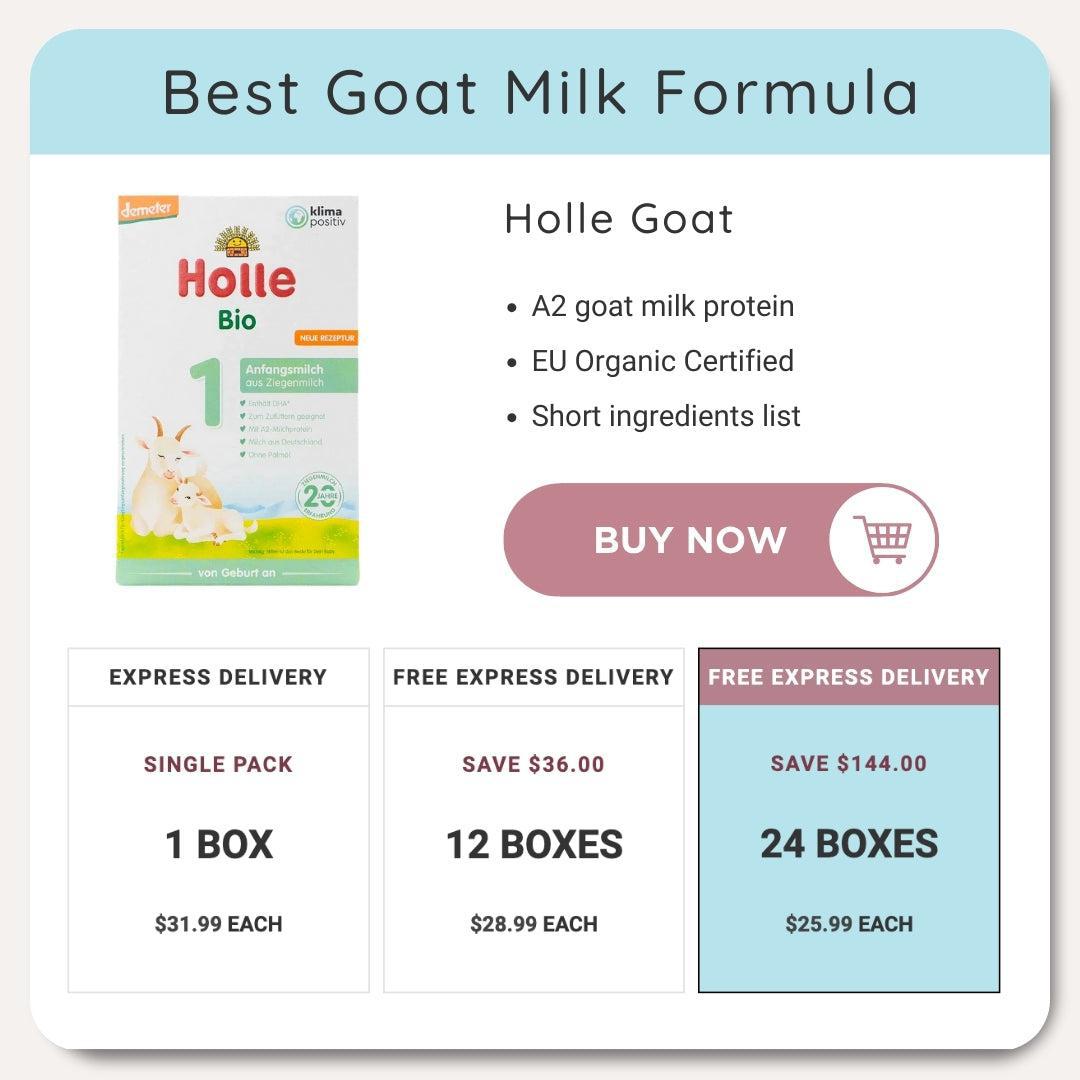
Holle goat milk formula is a mild European formula suitable for babies with feeding sensitivities to cow’s milk. This excludes more severe conditions like a cow's milk protein allergy or lactose intolerance. This European infant formula is meticulously crafted with a base of gentle organic goat's milk, which makes it a great choice when addressing digestive difficulties.
Pros ✔️
-
A2 goat milk protein
-
EU organic certified
Cons ❌
-
No prebiotics
-
No probiotics
Leading Qualities of Holle Goat
From the get-go, we were impressed with Holle's commitment to sourcing their ingredients sustainably, with a huge emphasis on animal welfare and environmental preservation. Each of Holle's goat milk-based formulas proudly bears the EU organic label and is GMO-free.
The base of whole goat's milk is naturally gentle and more easily digested by babies. This is mostly due to the fact that goat milk contains less Alpha S1 Casein milk protein than cow's milk. Instead, goat's milk contains A2 goat milk protein, which is made of smaller fat molecules and has a lower lactose content, this makes goat formulas for constipation a great option. Plus, Holle sources their milk from goats that have guaranteed access to fresh air 365 days a year!
We are happy to find that this formula has no added sugars or artificial sweeteners. Holle prides themselves on creating products that are not only abundantly nutritious but also clean and simple.
We appreciate the inclusion of both ARA and DHA in this formula. Notably, we were impressed by the DHA in this formula being sourced from algae, as opposed to fish oil.
European baby formulas are known for their top quality, and in this regard, Holle fits right in. They stand out by creating a formula that has a very simple and nourishing ingredient list. They choose their ingredients wisely, and for this reason, they have not included some otherwise popular ingredients used by other formula brands on our list, like probiotics.
Bonus Points Awarded to Holle Goat ☆
While this formula does not feature any added prebiotics, goat's milk contains naturally occurring prebiotics, which help improve digestion and regulate bowel movements.
To help your baby feel full for longer and to improve digestion, Holle has included organic corn-derived maltodextrin in this formula. Although this ingredient is omitted in Stage PRE to ensure it's extra gentle for newborns.
The inclusion of maltodextrin, along with a base of goat's milk creates an extremely smooth and creamy texture that we were impressed by. But, some parents are not a huge fan of this ingredient as it can seem subpar to lactose.
While this formula did lose points by adding maltodextrin to certain stages, we were happy to see that Stage PRE and Stage 1 are both starch-free, making them gentle on tiny tummies. Although, we did find organic starch in Stages 2 to 4 to offer older babies an additional source of energy.
Lastly, in some cases, palm oil can contribute to digestive issues, so we were relieved to find that its formula is palm oil-free!
What Parents Say 💬"Our son was extremely colicky and by the time he was 2.5 months, would push the bottle away and arch his back in pain (presumably from gas). We tried many other formulas including the ones everyone talks about, the ones that say they are gentle, the ones made to mirror European formula but not actually made in Europe and nothing helped. Then a friend told us about Holle and everything changed. No more pain and his stool appears much healthier as well. European formulas really are the best. Highly recommend." |
Holle Cow - Best Cow Milk Formula
Holle Cow is one of the best baby formulas on the market and is a go-to choice for many healthy babies. It is uniquely produced at Demeter-certified organic, biodynamic farms, and is held to the strictest European organic standards.
Pros ✔️
-
Demeter quality milk
-
Short ingredient list
-
Chemical-free agriculture practices
Cons ❌
-
No prebiotics
-
No probiotics
Leading Qualities of Holle Cow
Starting off strong, Holle Cow aligns with both European organic and Demeter biodynamic standards. Demeter farms take a biodynamic approach to farming, which means that they use chemical-free agricultural practices that respect animal welfare, biodiversity, and sustainability.
As you probably already guessed, GMOs are nowhere to be found in this formula! If you thought European organic standards were strict, the Demeter certification takes this product to a whole new level as they hold themselves to be the strictest organic certification worldwide.
What you will find in this European infant formula is a classic base of skimmed cow's milk. This ingredient has been a component of baby formula ingredients for decades. Holle, in particular, sources their Demeter milk from southern Germany, where happy cows have access to fresh air throughout the year.
We are once again pleased to see that 4/4 of the formulas discussed today have no added sugars or artificial sweeteners. We also appreciate that this infant formula contains an impressive fatty acid profile with both ARA and DHA!
Bonus Points Awarded to Holle Cow ☆
To keep this formula as simple as possible, Holle has omitted probiotics and prebiotics, but rest assured that it is still gentle on tiny tummies, and perfectly suitable for healthy babies.
Despite some parents wishing to avoid maltodextrin, Holle has included this ingredient in their powdered formulas, with the exception of Stage PRE and 1. This ingredient can help growing babies feel full for longer, which may ease some of the stress that comes along with frequent feedings.
The earlier stages of Holle Cow formula are starch-free, but you will find an organic starch in Stages 2, 3 and 4. This helps keep the formula thick and creamy while also naturally prolonging its shelf-life.
While it may not be favoured by some parents, we noticed that this formula does contain palm oil. After further research, we have found that Holle organic palm oil comes from certified sustainable production (RSPO segregated) in Colombia, Ecuador and West Africa, where ethical and health concerns are taken into consideration.
What Parents Say 💬"When our little angel was born we struggled to find the right formula for her; as I was not able to produce enough milk. The hospital provided us Enfamil. And reluctantly we tried it for a couple weeks. Regurgitation, gases, and irritability were consistent experiences every time she fed... We tried Holle goat formula and immediately there was a dramatic change in behavior. All side effects disappeared. She slept throughout the night and her digestion was a smooth process. We love Holle so much we've incorporated the porridges, cereals, and the weaning products as well." - Marn'i W |
Tell-Tale Signs That Your Baby Is Constipated
Now that we have given options for some of the best formulas for constipation let's get to the root of this condition. Starting with how do you even know that your infant is constipated in the first place?
A child aged 1 to 3 months normally has bowel movements four to 10 times a day. By the end of the first year, the frequency chances to at least once a day. But if these figures for healthy bowel movements aren't the norm for your child and those diapers are a little too clean for comfort, then constipation may be the culprit.
Baby constipation isn't super common, compared to other digestive conditions like spitting up. However, this condition does affect some children in early infancy, especially in formula-fed babies rather than exclusively breastfed babies.
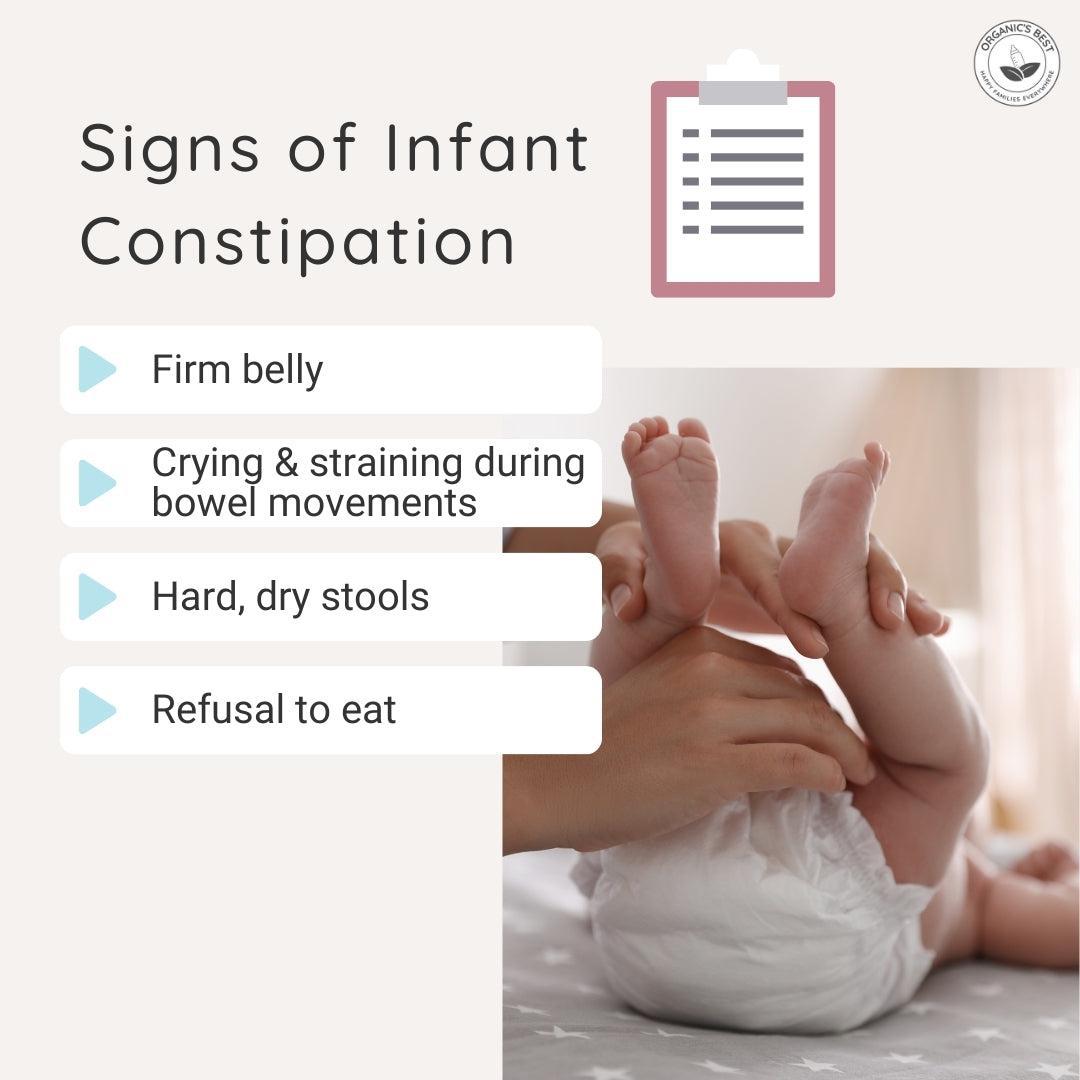
Here are some common signs of infant constipation:
-
Firm belly
-
Crying and straining hard during bowel movements
-
Hard, dry stools that may resemble clay
-
Refusal to eat
Common Causes of Constipation in Formula-Fed Babies
If you notice that your little one is constipated, one of the first steps to take is to figure out why, so that you can work on finding a solution. There are a number of aggravating factors for baby constipation, and it's important to consult your baby's pediatrician for help in addressing the root of and solutions for your baby's stool issues. Let's discuss some potential causes next:
Changes in Your Baby’s Diet
It's probably no surprise that a change to your baby's diet is one of the most common reasons for a baby's constipation. Whether you are transitioning from breastmilk to formula, formula to formula, or formula to solid foods, sometimes the tummy just needs time to adjust.
Notably, formula-fed babies are more prone to this condition compared to breastfed babies. So, if your breastfed baby has recently become a formula-fed baby, that might be your answer.
Dehydration
Babies are on an all-liquid diet for the first few months of life, so it might be surprising to hear that it is relatively common for infants to get dehydrated. This can happen due to illness, an inability to latch properly, or improper mixing of formula.
If you are formula feeding, it is essential to carefully follow a manufacturer's instructions for preparation, as proportions can vary by product. Always use the designated spoon provided with your product and read the label to figure out the appropriate ratio of formula to water. And, of course, remember to boil your drinking water to make sure it's safe for your little one.
Insufficient Fiber
If your little one is not getting enough fiber, especially during the transition to solid foods, your baby's digestive system can get a little backed up. The solution for this would be to include more fibrous foods in their diet, such as whole grains, legumes, fruits and veggies. As always, make sure that you are taking into account their age and stage of development before introducing new foods.
Cow’s Milk Protein Allergy
While up to 30% of infants and children experience constipation, only 4% are caused by medical problems such as cow's milk protein allergies. Although, in rare cases, infants may be diagnosed with cow's milk allergies. In this case, you may need to change over to a new formula. Prior to switching infant formulas, it is very important that you contact your child's doctor for personalized guidance on managing this condition.
Is Switching Formulas a Good Idea if Your Baby is Constipated?
As mentioned above, your little one's diet is a probable cause of their constipation, which means that a change in baby formula may help treat constipation. However, this should be done with caution, as changing baby formulas frequently or too quickly can result in additional and prolonged digestive discomfort.
On top of switching to a formula for constipation, other at-home remedies may also help relieve constipation, such as:
-
A warm bath to relax their bowel
-
Gently massaging their tummy in a clockwise direction
-
Lay baby on their back and gently move their legs in the motion of riding a bicycle to encourage bowel movements
How to Find the Best Formula to Help With Constipation
It's our job to make the journey of finding the right formula for your baby as simple as possible. For this reason, this section will offer more information about the best formula for constipation to help narrow down your search!
Which formula is best for babies with constipation?
Based on our evaluation, HiPP Dutch formula has ranked as number one in our search for the best formula for preventing constipation. That being said, all four of the formulas mentioned in this article are fantastic choices with their own unique qualities that may help alleviate constipation in babies.
Which formula causes less constipation?
The answer will depend on why your baby is constipated. If they are sensitive to lactose, it may be beneficial to opt for a reduced-lactose formula like HiPP Comfort, or a goat formula like Holle Goat. If you're looking for something extra gentle, then HiPP Dutch or Holle Cow may help with constipation. Always consult your baby's pediatrician prior to switching baby formulas.
What is the best formula for gas, fussiness, and constipation?
There are various options available if your little one is dealing with tummy troubles. Start by making an appointment with your pediatrician to help determine the cause of the troubles. Once you have figured out what is upsetting their stomach, it may be helpful to switch to a specialty formula, a reduced-lactose formula or a gentle formula like HiPP Dutch.
Conclusion: The Best Baby Formula for Constipation
As you spend more time with your little one, you're going to learn what's normal for them. If you notice changes in your baby's stool or their behaviour it is best to consult your pediatrician for personalized advice.
Constipation could be the cause of these changes if you notice that their stool is hard and dry or that their tummy is firm to the touch. Constipation can also result in a refusal to eat or extra fussiness during bowel movements.
If this is the case, your doctor may recommend changing baby formulas. With the advice of a healthcare professional, we encourage you to consider shifting to an infant formula from top brands like HiPP or Holle as a potential solution, as they carry various products designed to prevent constipation. In our evaluation, HiPP Dutch has come out on top as the best formula for constipation, but you are likely to have success with any of the products of the best formula for constipation on our list!
More Helpful Formula Guides! 📑
- HiPP vs Holle
- Holle Formula vs. Enfamil Organic
- HiPP Formula: German vs. Dutch vs. UK
- Best Organic Formula for Colic
- Best Formula for Sensitive Stomachs
Scientific References
- Bawa, A. S., & Anilakumar, K. (2012). Genetically modified foods: safety, risks and public concerns—a review. Journal of Food Science and Technology, 50(6), 1035–1046.
- Clouard, C., Bourgot, C. L., Respondek, F., Bolhuis, J., & Gerrits, W. (2018). A milk formula containing maltodextrin, vs. lactose, as main carbohydrate source, improves cognitive performance of piglets in a spatial task. Scientific Reports, 8(1).
- Gallier, S., Van Den Abbeele, P., & Prosser, C. G. (2020). Comparison of the Bifidogenic Effects of Goat and Cow Milk-Based Infant Formulas to Human Breast Milk in an in vitro Gut Model for 3-Month-Old Infants. Frontiers in Nutrition, 7.
- Ho, J. M. D., & How, C. H. (2020). Chronic constipation in infants and children. Singapore Medical Journal , 61(2), 63–68.
- Xu, M., Wang, Y., Dai, Z., Zhang, Y., Li, Y., & Wang, J. (2015). Comparison of growth and nutritional status in infants receiving goat milk–based formula and cow milk–based formula: a randomized, double-blind study. Food & Nutrition Research, 59(1), 28613.
Disclaimer:
Please be aware that this information is based on general trends in babies, and it is not medical advice. Your doctor should be your first source of information and advice when considering any changes to your child’s formula and when choosing your child’s formula. Always consult your pediatrician before making any decisions about your child’s diet or if you notice any changes in your child. Breastfeeding is the best nutrition for your baby because breast milk provides your child with all the essential nutrients they need for growth and development. Please consult your pediatrician if your child requires supplemental feeding. |
Agustina Fernandez
Dr. Agustina Fernandez earned her medical degree from the prestigious Universidad Nacional de Córdoba, Argentina. With a deep-rooted passion for pediatrics, Dr. Fernandez is currently on the path to specializing in children's healthcare. Recently, she has delved into the vital field of infant nutrition. Her research interests include breastfeeding, infant formula, and baby food in little ones’ formative years. Dr. Fernandez's commitment to this area of study underscores her dedication to ensuring the health and well-being of children from their earliest days.
Leave a comment
Comments will be approved before showing up.
Also in Organic Infant Nutrition and Health Blog

Formula Storage: How Long is Formula Good For?
by Agustina Fernandez May 15, 2024 7 min read
Read More
Toxic Baby Formula Ingredients to Watch Out For
by Agustina Fernandez May 13, 2024 8 min read
Read More
Reviewed by Dr. Po-Chang Hsu, MD, MS
-

Dr. Hsu received his medical degree from Tufts University in Boston, Massachusetts, and holds a Master’s of Science degree from both Harvard University and Tufts University.
Dr. Hsu did research in MRI neuroimaging research of fetal brains at Boston Children’s Hospital, an affiliated hospital of Harvard Medical School. Dr. Hsu is currently a full-time medical writer and consultant.
Outside of the medical profession, Dr. Hsu loves to write, learn new languages, and travel
